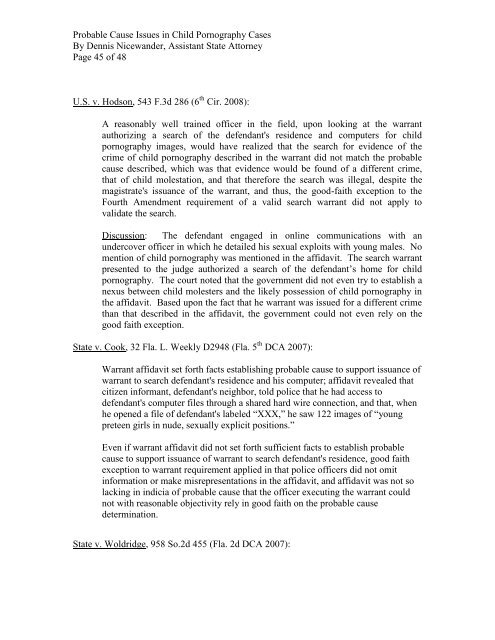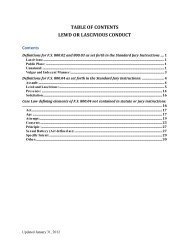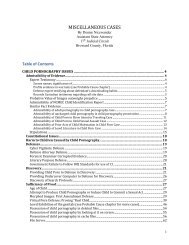Probable Cause Issues in Child Pornography ... - Locatethelaw.org
Probable Cause Issues in Child Pornography ... - Locatethelaw.org
Probable Cause Issues in Child Pornography ... - Locatethelaw.org
You also want an ePaper? Increase the reach of your titles
YUMPU automatically turns print PDFs into web optimized ePapers that Google loves.
<strong>Probable</strong> <strong>Cause</strong> <strong>Issues</strong> <strong>in</strong> <strong>Child</strong> <strong>Pornography</strong> Cases<br />
By Dennis Nicewander, Assistant State Attorney<br />
Page 45 of 48<br />
U.S. v. Hodson, 543 F.3d 286 (6 th Cir. 2008):<br />
A reasonably well tra<strong>in</strong>ed officer <strong>in</strong> the field, upon look<strong>in</strong>g at the warrant<br />
authoriz<strong>in</strong>g a search of the defendant's residence and computers for child<br />
pornography images, would have realized that the search for evidence of the<br />
crime of child pornography described <strong>in</strong> the warrant did not match the probable<br />
cause described, which was that evidence would be found of a different crime,<br />
that of child molestation, and that therefore the search was illegal, despite the<br />
magistrate's issuance of the warrant, and thus, the good-faith exception to the<br />
Fourth Amendment requirement of a valid search warrant did not apply to<br />
validate the search.<br />
Discussion: The defendant engaged <strong>in</strong> onl<strong>in</strong>e communications with an<br />
undercover officer <strong>in</strong> which he detailed his sexual exploits with young males. No<br />
mention of child pornography was mentioned <strong>in</strong> the affidavit. The search warrant<br />
presented to the judge authorized a search of the defendant’s home for child<br />
pornography. The court noted that the government did not even try to establish a<br />
nexus between child molesters and the likely possession of child pornography <strong>in</strong><br />
the affidavit. Based upon the fact that he warrant was issued for a different crime<br />
than that described <strong>in</strong> the affidavit, the government could not even rely on the<br />
good faith exception.<br />
State v. Cook, 32 Fla. L. Weekly D2948 (Fla. 5 th DCA 2007):<br />
Warrant affidavit set forth facts establish<strong>in</strong>g probable cause to support issuance of<br />
warrant to search defendant's residence and his computer; affidavit revealed that<br />
citizen <strong>in</strong>formant, defendant's neighbor, told police that he had access to<br />
defendant's computer files through a shared hard wire connection, and that, when<br />
he opened a file of defendant's labeled “XXX,” he saw 122 images of “young<br />
preteen girls <strong>in</strong> nude, sexually explicit positions.”<br />
Even if warrant affidavit did not set forth sufficient facts to establish probable<br />
cause to support issuance of warrant to search defendant's residence, good faith<br />
exception to warrant requirement applied <strong>in</strong> that police officers did not omit<br />
<strong>in</strong>formation or make misrepresentations <strong>in</strong> the affidavit, and affidavit was not so<br />
lack<strong>in</strong>g <strong>in</strong> <strong>in</strong>dicia of probable cause that the officer execut<strong>in</strong>g the warrant could<br />
not with reasonable objectivity rely <strong>in</strong> good faith on the probable cause<br />
determ<strong>in</strong>ation.<br />
State v. Woldridge, 958 So.2d 455 (Fla. 2d DCA 2007):





